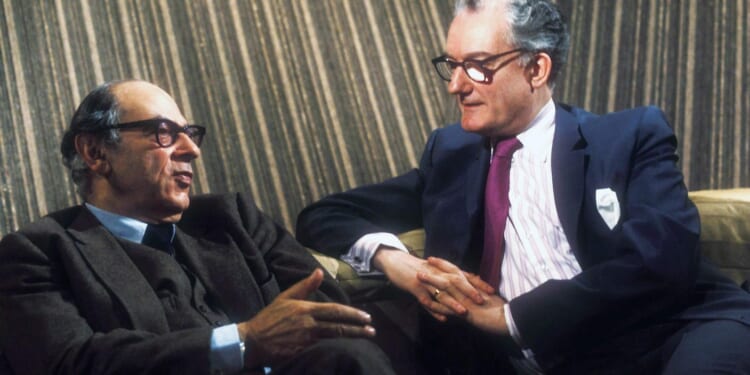In 1977, the BBC made a hugely popular television series about philosophy. The title was Men of Ideas; the guests were all middle-aged or elderly; and the presenter was a highly erudite Labour MP. It is hard to imagine any of these things happening now.
A million viewers would tune in to watch Bryan Magee deep in conversation with a different distinguished philosopher each week. The two would be perched at opposite ends of a beige leatherette sofa, furrowing their brows over such matters as “the Frankfurt school” or “logical positivism and its legacy”. Magee’s idea of diversity was inviting Iris Murdoch to be an honorary man of ideas for one episode. No quarter was given to short attention spans either: ADHD was apparently not a big thing in the Seventies. Anyone in search of visual excitement had to make do with the sight of Charles Taylor’s blue velour suit, Noam Chomsky’s expansive hand gestures, or the elegant way A.J. Ayer puffed on his fag.
In 1987, and by then no longer an MP, Magee made another series: The Great Philosophers. This week it became available to watch on BBC4 and iPlayer. Magee’s specs have grown comically large and Ayer seems to have given up smoking, but otherwise the series format is similar to that of a decade earlier. Contemporary luminaries of Anglo-American philosophy are each given an intellectual titan or two as their specialist subject; and so we get Anthony Kenny on mediaeval philosophy, Hubert Dreyfus on Husserl and Heidegger, and Ayer on Frege and Russell, for instance.
With Magee’s skilful promptings, the viewer is treated to a fascinating tour of the cathedral of information nestling within each guest’s mind. Arguments and theories are treated not as historical curiosities but as live cognitive possibilities, and are taken very seriously. In an abstract world, the tense is always the present, even when you are talking about concepts from the past.
My favourite episodes from The Great Philosophers involve, respectively, Aristotle as illuminated by Martha Nussbaum — the only female guest in the series — and Bernard Williams on Descartes. Nussbaum’s mannered, queenly delivery and vice-like grasp of her subject matter is exactly what you might expect from a person who once revealed that she didn’t listen to music when she went running, preferring to memorise an opera score from start to finish, then mentally rehearse it as she jogged along. In her episode, she also spends quite some time distinguishing between “wearing brown” as a contingent property of Magee, and “being human” as a necessary one.
Williams, meanwhile, is a picture of relaxation in corduroy. Eyes crinkling and a smile perpetually hovering on his lips, the urbane Essex native and former RAF pilot is clearly having a whale of a time explaining the Cartesian method of doubt, why wax doesn’t lose its identity even when melted, and why the soul absolutely does not interact with the body through the pineal gland. As an undergraduate a few years after this was filmed, I would sometimes go to hear Williams give lectures on similar themes. Entranced, I’d watch as he would pace about the room, stare at the ground, or look out through the diamond leaded windows behind him, all the while uttering complicated sentences fluently without any notes. Rarely having done the reading beforehand, I had only the scarcest idea what he was on about, but the towering intellect and huge charisma were perfectly obvious.
Nussbaum apparently also found Williams mesmerising. When he died in 2003, she wrote a lengthy, emotional tribute in the Boston Review. In this extraordinary piece, she confesses feelings of admiration and love for her former teacher, but of rivalrous anger too. She remembers the first time she ever heard him lecture: “It will tell you a great deal about that moment that I remember both his dark green sports jacket and precisely what I myself was wearing: a pink minidress from Bergdorf Goodman and black fishnet stockings.” She also says that their friendship eventually became strained due to his developing interest in “Nietzschean anti-rationalism and pessimism”, and her inability to hold back criticism because of it. Another thing that appears to make her angry is remembering once going running in “orange running shorts with a pink top”, then being told afterwards by Williams, who had seen her in motion, that “the primary qualities were acceptable, but the secondary qualities rather off”. To this, she complains that “women live in objectification the way fish live in water” — a point which seems slightly disingenuous, given all that previous sartorial detail.
“Williams died in 2003, far too early; but at least he missed the vituperative hellhole the philosophy profession would become a decade later.”
Williams died in 2003, far too early; but at least he missed the vituperative hellhole the philosophy profession would become a decade later. Cheered on by a pitiless online mob, harsh, career-wrecking punishments were meted out for what had been treated as mild and forgivable infractions only a few years before. A question, already artlessly foreshadowed in Nussbaum’s memorial for Williams, became prominent for many women philosophers in the 2010s: is my fellow male philosopher my colleague, friend, lover, or deadly enemy? Several prominent thinkers discovered the narrative could switch from one answer to another overnight; and that if it did, the world you thought you knew would melt around you like Descartes’ wax.
One famous case involved John Searle, author of the famous “Chinese room” test for machine consciousness. Searle can also be seen in The Great Philosophers, talking with lucid brilliance about Wittgenstein. Thirty years later, he would be presented with a lawsuit accusing him of sexual harassment at Berkeley, where he had taught for most of his life. A petition, signed by thousands of alumnae, would see him stripped of his emeritus professor status. He died last month in a care home. According to a former colleague, Searle “never recovered” from the reputational loss.
In this respect then, The Great Philosophers puts us in mind of a simpler, more innocent time. We are invited not just to thrill at the originality and ingenuity of giants in the history of philosophy, but also to admire the improbably gifted, marvellously eccentric people on screen talking about them. What these people get up to in their personal lives is irrelevant; indeed, as one watches one can barely imagine them having any personal lives at all. And as we enjoy them showing off their prodigious discursive talents, we are also invited to try to understand complicated abstract ideas — for no useful or self-interested reason, but simply as a valuable goal in itself.
All of this is very old-fashioned, and not just because nobody has the requisite powers of concentration anymore. The concept of a “great philosopher” has been suspect for years, a bit too male and hierarchical for comfort. These days, it always has to come with lots of caveats. In the short film which accompanied the broadcasting of The Great Philosophers on BBC4 this week, public philosopher Professor Angie Hobbs rushes depressingly quickly to the cliché that, as young female philosopher watching the show in the Eighties, “it was really important for me to see a woman on that sofa”. She also tries to justify the value of philosophy in the present day in instrumental terms, claiming that it helps people discern “the fake news and the conspiracy theories and the snake oil merchants out there”. This is a point I’m surprised any member of the philosophy profession can make with a straight face, given ongoing mass delusions therein.
But the truth is that the vast majority of the millions of viewers enthusiastically watching Men of Ideas and The Great Philosophers in the Seventies and Eighties were not at university, and had no desire whatsoever to be professional philosophers themselves. Fretting over equality issues, worrying about the latent prejudice of Thomas Aquinas or David Hume, or selfishly looking for inspiring “representation” was very far down the list of their priorities. And nor were they watching in order to improve their falsehood detection skills in ordinary life. Their aim was just to understand these enjoyable, fascinating, unusual ideas, as articulated by these enjoyable, fascinating, unusual people — for no motive other than sheer curiosity. I hear that corduroy is coming back into fashion. Perhaps we might also allow philosophers to be unreservedly great again too.

















